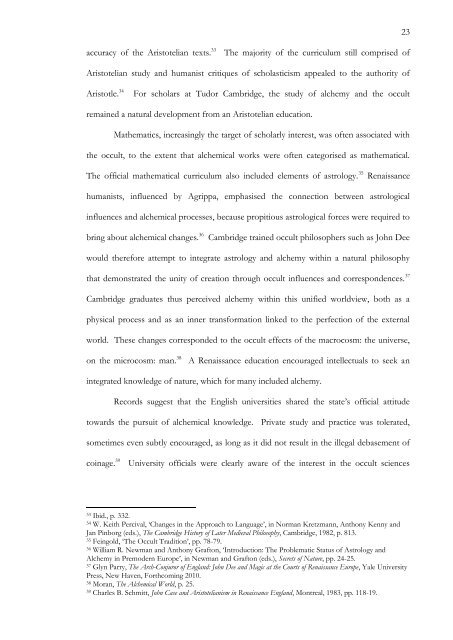The Alchemical Patronage of Sir William Cecil, Lord Burghley
The Alchemical Patronage of Sir William Cecil, Lord Burghley
The Alchemical Patronage of Sir William Cecil, Lord Burghley
You also want an ePaper? Increase the reach of your titles
YUMPU automatically turns print PDFs into web optimized ePapers that Google loves.
accuracy <strong>of</strong> the Aristotelian texts. 33 <strong>The</strong> majority <strong>of</strong> the curriculum still comprised <strong>of</strong><br />
Aristotelian study and humanist critiques <strong>of</strong> scholasticism appealed to the authority <strong>of</strong><br />
Aristotle. 34 For scholars at Tudor Cambridge, the study <strong>of</strong> alchemy and the occult<br />
remained a natural development from an Aristotelian education.<br />
Mathematics, increasingly the target <strong>of</strong> scholarly interest, was <strong>of</strong>ten associated with<br />
the occult, to the extent that alchemical works were <strong>of</strong>ten categorised as mathematical.<br />
<strong>The</strong> <strong>of</strong>ficial mathematical curriculum also included elements <strong>of</strong> astrology. 35 Renaissance<br />
humanists, influenced by Agrippa, emphasised the connection between astrological<br />
influences and alchemical processes, because propitious astrological forces were required to<br />
bring about alchemical changes. 36 Cambridge trained occult philosophers such as John Dee<br />
would therefore attempt to integrate astrology and alchemy within a natural philosophy<br />
that demonstrated the unity <strong>of</strong> creation through occult influences and correspondences. 37<br />
Cambridge graduates thus perceived alchemy within this unified worldview, both as a<br />
physical process and as an inner transformation linked to the perfection <strong>of</strong> the external<br />
world. <strong>The</strong>se changes corresponded to the occult effects <strong>of</strong> the macrocosm: the universe,<br />
on the microcosm: man. 38 A Renaissance education encouraged intellectuals to seek an<br />
integrated knowledge <strong>of</strong> nature, which for many included alchemy.<br />
Records suggest that the English universities shared the state‘s <strong>of</strong>ficial attitude<br />
towards the pursuit <strong>of</strong> alchemical knowledge. Private study and practice was tolerated,<br />
sometimes even subtly encouraged, as long as it did not result in the illegal debasement <strong>of</strong><br />
coinage. 39 University <strong>of</strong>ficials were clearly aware <strong>of</strong> the interest in the occult sciences<br />
33 Ibid., p. 332.<br />
34 W. Keith Percival, ‗Changes in the Approach to Language‘, in Norman Kretzmann, Anthony Kenny and<br />
Jan Pinborg (eds.), <strong>The</strong> Cambridge History <strong>of</strong> Later Medieval Philosophy, Cambridge, 1982, p. 813.<br />
35 Feingold, ‗<strong>The</strong> Occult Tradition‘, pp. 78-79.<br />
36 <strong>William</strong> R. Newman and Anthony Grafton, ‗Introduction: <strong>The</strong> Problematic Status <strong>of</strong> Astrology and<br />
Alchemy in Premodern Europe‘, in Newman and Grafton (eds.), Secrets <strong>of</strong> Nature, pp. 24-25.<br />
37 Glyn Parry, <strong>The</strong> Arch-Conjuror <strong>of</strong> England: John Dee and Magic at the Courts <strong>of</strong> Renaissance Europe, Yale University<br />
Press, New Haven, Forthcoming 2010.<br />
38 Moran, <strong>The</strong> <strong>Alchemical</strong> World, p. 25.<br />
39 Charles B. Schmitt, John Case and Aristotelianism in Renaissance England, Montreal, 1983, pp. 118-19.<br />
23















